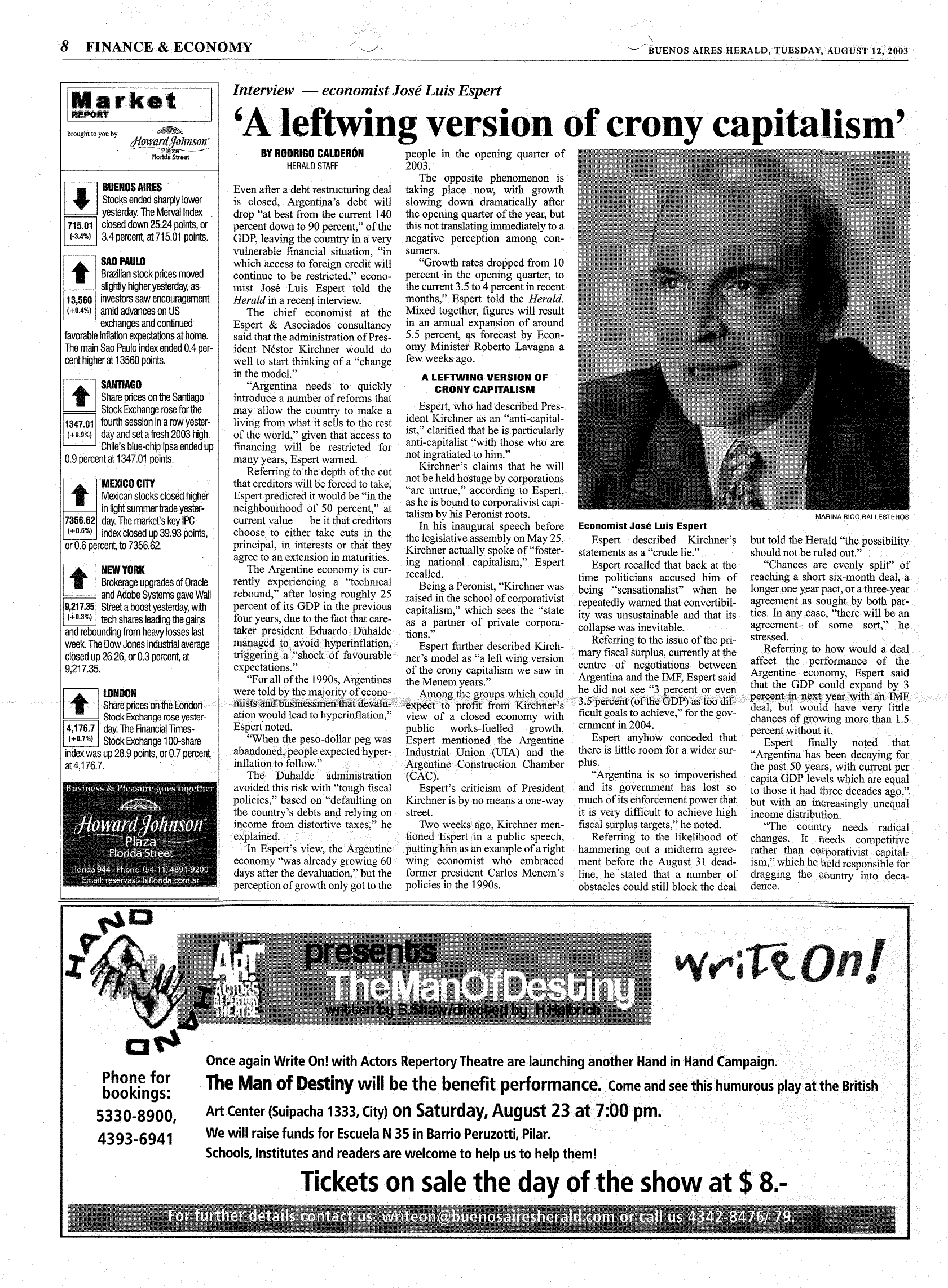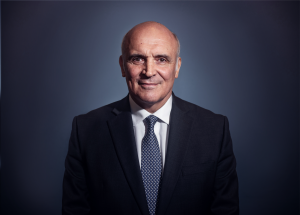By Rodrigo Caldern –
Herald staff
Even after a debt restructuring deal is closed, Argentina’s debt will drop “at best from the current 140 percent down to 90 percent,” of the GDP, leaving the country in a very vulnerable financial situation, “in which access to foreign credit will continue to be restricted,” economist Jos Luis Espert told the Herald in a recent interview.
The chief economist at the Espert & Asociados consultancy said that the administration of President Néstor Kirchner would do well to start thinking of a “change in the model.”
“Argentina needs to quickly introduce a number of reforms that may allow the country to make a living from what it sells to the rest of the world,” given that access to financing will be restricted for many years, Espert warned.
Referring to the depth of the cut that creditors will be forced to take, Espert predicted it would be “in the neighbourhood of 50 percent,” at current value _ be it that creditors choose to either take cuts in the principal, in interests or that they agree to an extension in maturities.
The Argentine economy is currently experiencing a “technical rebound,” after losing roughly 25 percent of its GDP in the previous four years, due to the fact that caretaker president Eduardo Duhalde managed to avoid hyperinflation, triggering a “shock of favourable expectations.”
“For all of the 1990s, Argentines were told by the majority of economists and businessmen that devaluation would lead to hyperinflation,” Espert noted.
“When the peso-dollar peg was abandoned, people expected hyperinflation to follow.”
The Duhalde administration avoided this risk with “tough fiscal policies,” based on “defaulting on the country’s debts and relying on income from distortive taxes,” he explained.
In Espert’s view, the Argentine economy “was already growing 60 days after the devaluation,” but the perception of growth only got to the people in the opening quarter of 2003.
The opposite phenomenon is taking place now, with growth slowing down dramatically after the opening quarter of the year, but this not translating immediately to a negative perception among consumers.
“Growth rates dropped from 10 percent in the opening quarter, to the current 3.5 to 4 percent in recent months,” Espert told the Herald. Mixed together, figures will result in an annual expansion of around 5.5 percent, as forecast by Economy Minister Roberto Lavagna a few weeks ago.
A LEFT WING VERSION OF CRONY CAPITALISM
Espert, who had described President Kirchner as an “anti-capitalist,” clarified that he is particularly anti-capitalist “with those who are not ingratiated to him.”
Kirchner’s claims that he will not be held hostage by corporations “are untrue,” according to Espert, as he is bound to corporativist capitalism by his Peronist roots.
In his inaugural speech before the legislative assembly on May 25, Kirchner actually spoke of “fostering national capitalism,” Espert recalled.
Being a Peronist, “Kirchner was raised in the school of corporativist capitalism,” which sees the “state as a partner of private corporations.”
Espert further described Kirchner’s model as “a left wing version of the crony capitalism we saw in the Menem years.”
Among the groups which could expect to profit from Kirchner’s view of a closed economy with public works-fuelled growth, Espert mentioned the Argentine Industrial Union (UIA) and the Argentine Construction Chamber (CAC).
Espert’s criticism of President Kirchner is by no means a one-way street.
Two weeks ago, Kirchner mentioned Espert in a public speech, putting him as an example of a right wing economist who embraced former president Carlos Menem’s policies in the 1990s.
Espert described Kirchner’s statements as a “crude lie.”
Espert recalled that back at the time politicians accused him of being “sensationalist” when he repeatedly warned that convertibility was unsustainable and that its collapse was inevitable.
Referring to the issue of the primary fiscal surplus, currently at the centre of negotiations between Argentina and the IMF, Espert said he did not see “3 percent or even 3.5 percent (of the GDP) as too difficult goals to achieve,” for the government in 2004.
Espert anyhow conceded that there is little room for a wider surplus.
“Argentina is so impoverished and its goverment has lost so much of its enforcement power that it is very difficult to achieve high fiscal surplus targets,” he noted.
Referring to the likelihood of hammering out a mid-term agreement before the August 31 deadline, he stated that a number of obstacles could still block the deal but told the Herald “the possibility should not be ruled out.”
“Chances are evenly split” of reaching a short six-month deal, a longer one year pact, or a three-year agreement as sought by both parties. In any case, “there will be an agreement of some sort,” he stressed.
Referring to how would a deal affect the performance of the Argentine economy, Espert said that the GDP could expand by 3 percent in next year with an IMF deal, but would have very little chances of growing more than 1.5 percent without it.
Espert finally noted that “Argentina has been decaying for the past 50 years, with current per capita GDP levels which are equal to those it had three decades ago,” but with an increasingly unequal income distribution.
“The country needs radical changes. It needs competitive rather than corporativist capitalism,” which he held responsible for dragging the country into decadence.
Nota Original: BUENOS AIRES HERALD | 12/08/2003


